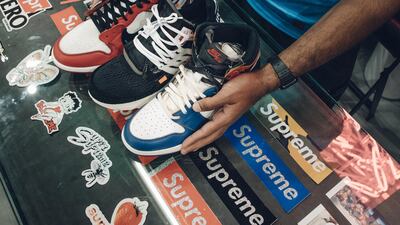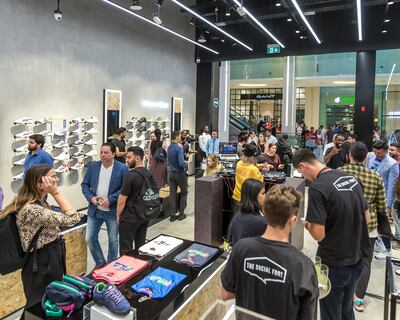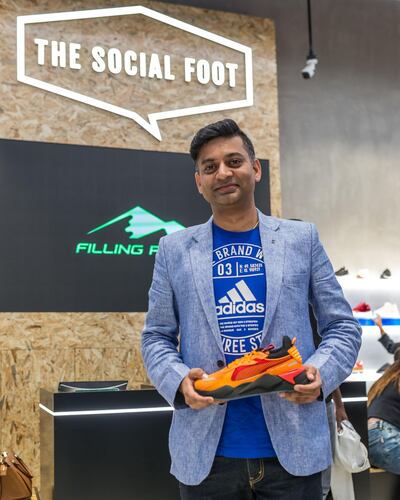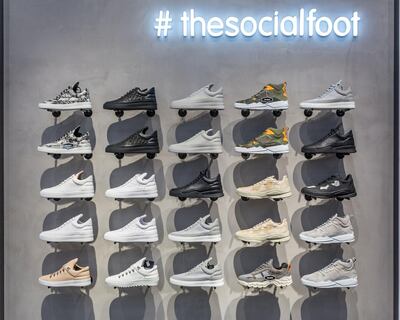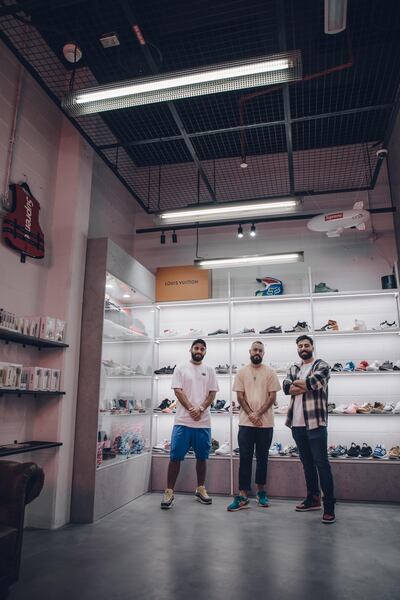As one of the world’s most culturally diverse countries, the UAE has a style quotient that can’t exactly be defined in black and white. But despite its complex nature, the overriding theme has, traditionally, been rooted in luxury items from big-name brands.
While Londoners are effortlessly edgy and Scandinavians notoriously understated, the UAE, with its endless malls and palpable wealth, is a high-fashion haven. What you wouldn’t necessarily associate with this part of the world, however, is streetwear – but that is beginning to change. Slowly, but surely, this style movement has used its hand-painted high-tops and limited-edition cross trainers to creep its way onto the style scene.
The arrival of The Social Foot in The Dubai Mall illustrates the ferocious appetite for streetwear right now. This small, unassuming store is swallowed by the noise of the monster shopping centre in which it sits, and despite no prior announcements, there is a sizeable mob to greet it on its official opening day. This is a crowd that stands out from the crowd, with painfully cool trainers and laid-back attire.
For these trainer lovers, or sneakerheads, as they’re known, it’s about more than just the footwear. The Social Foot is surrounded by shoes on all sides; there’s Puma next door, Adidas opposite, and Nike down the way, but these shoppers don’t want just any old pair, they want something exclusive, something unique and something that, until now, has been hard to come by in Dubai: you had to know where to look. The Social Foot will change that, though, introducing new brands from around the world, and partnering with bigger brands to bring exclusive and limited-edition shoes and collaborations to the UAE.
“To be honest, I think this concept should have come some time ago, we are a bit late,” says Anuvrat Gaurav, head of retail at Al Futtaim, the company responsible for bringing the brand to the UAE. It’s a fair admission. The streetwear scene in the UAE has, historically, been wildly undercatered for. And yet, with more than 28,000 people attending Sole DXB – Dubai’s trainer, streetwear and music festival – in December, it seems the market is ripe for its brands’ taking.
Sole DXB and the UAE’s streetwear explosion is something of a chicken-and-egg situation. Of course, there had to be a scene here for the concept to be born, but would it have grown to the point it’s at without such a high-profile platform to anchor it? Probably not.
“When we started in 2011, we were knocking on doors convincing businesses there was a market here for [unique trainers],” says Joshua Cox, co-founder of Sole DXB.
“There were all the elements of street culture in their individual pockets – graffiti artists, BMXers, sneakerheads – but there was nothing to bring them together, and that’s how Sole DXB started.” Bring them together it did – and now it’s the brands that are approaching Sole DXB to be part of the event. Last year saw Puma, Reebok and Dior Homme among the big names the event partnered with, as well hosting exhibits from about 50 local and international streetwear brands. The event has been instrumental in giving residents access to streetwear, opening their eyes to footwear that goes beyond the confinement of malls. And the result is breeding a new wave of style rules.
“A few years ago, the style here was more pretentious. There was not a lot of underground culture. But that is changing, thanks to a few home-grown brands, and more and more stores opening up,” Cox says. “But whereas street style in London or New York is influenced by its historic underground culture that helps to differentiate it, Dubai is a young city and it’s just starting to find its own fashion footing. Many are still experimenting with their own styles and identities, and it’s these individuals who will define what streetwear means in the UAE.”
And, as Cox points out, this is an exciting new version of streetwear, given that the styles had, traditionally, always been typically western. “The challenge for people here had always been: ‘How do I take these styles and merge them with my heritage?’ Coming from, say, an Indian or Arab background can add a whole other layer and really give people a chance to experiment.”
This experimental style was given another huge boost in November when Abu Dhabi neighbourhood barber and coffee shop Local expanded its offering to include rare trainers and limited-edition streetwear.
“There’s been a general shift towards streetwear globally, and a lot of that is down to social media. London has an identity, people have their own style, Paris is the same, so is Japan – people dress a certain way in those cities; you can tell the style. And we are now are finding that in Dubai. People are dressing the way they want to dress, but a few years ago there just wasn’t much of that,” says Jack Brett, one of the owners of Local. “People are pushing boundaries with fashion, and I think it’s great. They are now brave to wear what they want to wear here and put their own sense of creativity in the way they dress.”
Local's backroom, as Brett calls it, is found behind a sliding silver door, and contains small-number, vintage and new-drop trainers from around the world. As a self-confessed collector with almost 250 pairs himself, he explains the appeal. "It's an addiction, a bad one, because it takes your money like that [snaps], but it's also a passion. People want something different, something their friends don't have, and it feels like you're part of this bigger community. And because you can make so much money off one pair of shoes, a lot of people have come into it to try and flip shoes– it's very addictive," he says.
While the rise of sneaker culture and streetwear may mark a new chapter in our region’s fashion history, its roots, just like the trends that came before it, are founded on exclusivity. Both The Social Foot and Local stock styles and brands exclusively – trainers or clothing that you won’t find anywhere else, or on anyone else in the UAE.
“People want what their friends won’t have. They want to stand out on social media, they want to stand out in their circle. They want to be exclusive,” agrees Gaurav. “That’s what The Social Foot stands for – uniqueness.”
Of course, trends come and go, and trainers are very much in at the moment, but Cox believes that now that the UAE has a thriving streetwear scene, it’s here to stay. “Sneakers have come back in a big way in the past few years, helped a lot by hip-hop and social media, but they are part of the wider streetwear scene and that is more than just fashion, it’s culture, and that’s not going anywhere,” he says. “Streetwear and the culture that surrounds it is what is happening out on the streets at a ground level. What that looks like will change and adapt, but its roots will remain the same.”
____________________
Read more:
An older person’s guide to dressing up for Sole DXB without looking like someone’s dad
A closer look at the business of being a fashion model
An exhibition of world-famous shoes is currently on display at The Dubai Mall
____________________
